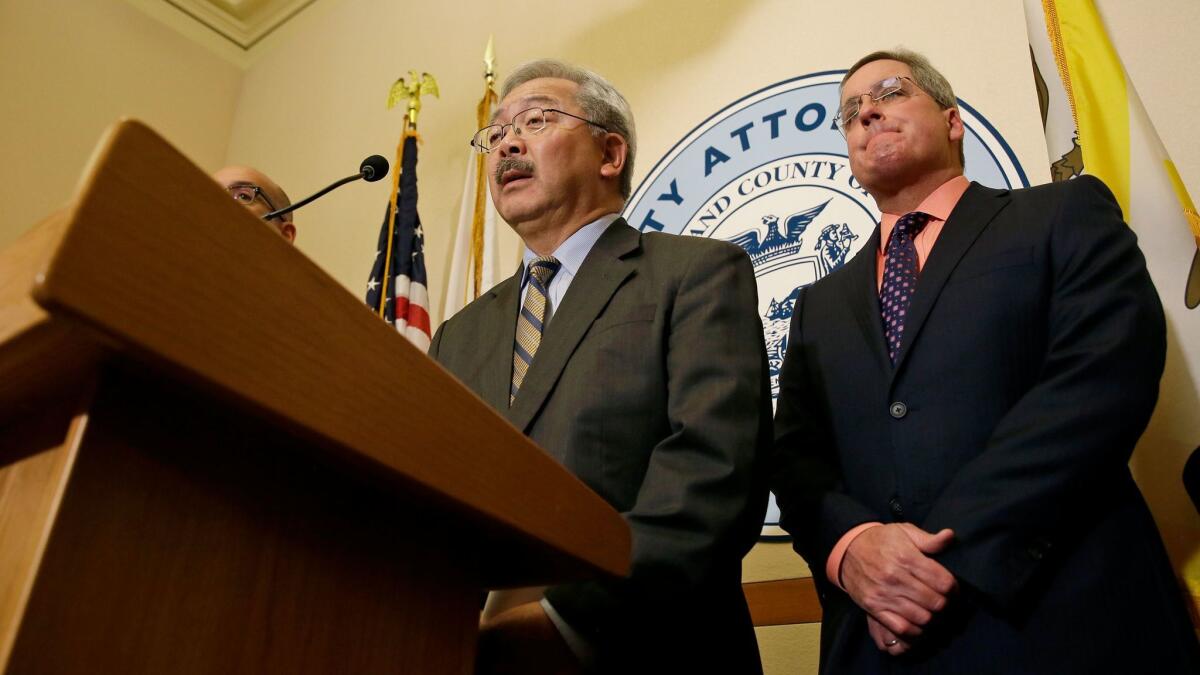Trump lawyer says sanctuary city directive is ‘narrow’

A lawyer for the Trump administration told a federal judge Friday that an executive order targeting so-called sanctuary cities and counties was “narrow” and would not result in a loss of massive funds to governments that refuse to cooperate with immigration authorities.
During a hearing on lawsuits filed by San Francisco and Santa Clara County challenging the administration, acting Asst. Atty. Gen. Chad A. Readler said Trump’s Jan. 25 order was intended merely to highlight an issue the president cares deeply about and would apply “only to a limited range of grants” from the Departments of Justice and Homeland Security.
“We don’t know yet exactly how the policy is going to be applied,” Readler told U.S. District Court Judge William H. Orrick, a President Obama appointee. “We don’t know whether there will be any enforcement action and what it will look like.”
Readler’s statements were the first indication that Trump’s executive order might have little bite.
The order directed the attorney general and secretary for Homeland Security to ensure that “sanctuary” jurisdictions “are not eligible to receive federal grants,” and said the secretary could determine which governments were sanctuary jurisdictions.
Readler said that the order would affect only law enforcement grants and that cities and counties would be notified if their grants were in jeopardy. Santa Clara County receives less than $1 million of the affected grants, and San Francisco doesn’t appear to receive any of that money, Readler said.
In response to a question from Orrick, Readler said he agreed that the Trump administration could not put new conditions on federal funds already authorized by Congress.
San Francisco and Santa Clara County have asked Orrick to block Trump’s order nationally, arguing that it unconstitutionally infringes on the authority of states and local governments and threatens to cut billions of dollars from the two jurisdictions.
Orrick did not clearly indicate how he was leaning but promised to “try to get an order out as soon as I can.”
Lawyers for Santa Clara County and San Francisco pointed to the broad wording in Trump’s order and urged the judge to consider the statements of the president and Atty. Gen. Jeff Sessions in denouncing sanctuary governments.
They suggested that the Justice Department was putting a new interpretation on the order to save it from being struck down.
“The government argument boils down to the hope that President Trump and Atty. Gen. Sessions won’t do what they are saying they are going to do with this executive order,” said John W. Keker, representing Santa Clara County.
There are about 400 sanctuary cities and counties in the country, including Los Angeles, that do not take part in immigration enforcement actions. The city and county of Los Angeles have joined friend-of-the-court briefs in support of an injunction.
Santa Clara County officials said the county stands to lose $1.7 billion if Trump’s order is enforced. San Francisco’s suit said the city could lose $1.2 billion a year in federal funding, most of it for healthcare, nutrition and other programs for the poor.
Immigration authorities want counties to notify them when immigrants who are in the country illegally are in jail and to hold them beyond their release dates so agents can determine whether they can be deported.
But Readler said in court that the government can only request counties to hold inmates longer than their release dates, not compel them, though the U.S. has an interest in having cities help immigration authorities.
Backers of sanctuary regions say they refuse to cooperate with immigration authorities, unless they have criminal warrants, because they want to ensure immigrants bring their children to school and vaccinate them and report crimes to the police.
Cities and counties in California and in 12 other states have urged Orrick to issue a preliminary injunction against Trump’s order. Public school districts, California sheriff departments and police chiefs from 11 states also have sided with the challengers in friend-of-the-court written arguments.
Twitter: @mauradolan
ALSO
After errors, ICE suspends reports designed to embarrass ‘sanctuary cities’
What you need to know about California’s ‘sanctuary state’ bill and how it would work
NASA detained a 75-year-old woman selling a tiny moon rock. An appeals court says she can sue
UPDATES:
12:10 p.m.: This article was updated with more details from the hearing.
11:10 a.m.: This article was updated with details from the hearing.
This article was originally published at 3 a.m.
More to Read
Start your day right
Sign up for Essential California for news, features and recommendations from the L.A. Times and beyond in your inbox six days a week.
You may occasionally receive promotional content from the Los Angeles Times.







